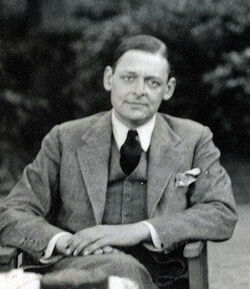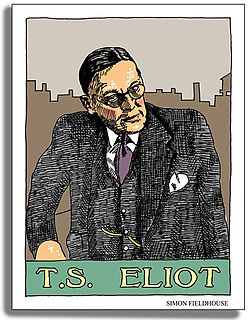
1934 photograph of T.S. Eliot by Lady Ottoline Morell.
Thomas Stearns Eliot (September 26, 1888 - January 4, 1965) was an award-winning poet, playwright, and essayist. Born in St. Louis, Missouri, U.S., Eliot became a British citizen in 1927. He was one of the leading figures in the modernist movement in poetry which sought to break away from the restrictive Victorian formal conventions. His best-known works include The Waste Land (1922), considered by many to be the most influential poem in English of the twentieth century, and Four Quartets (1943), a collection of religiously-themed poems. His Old Possum's Book of Practical Cats (1939), a collection of whimsical poems he sent to his godchildren, inspired the hit musical Cats. Eliot is also remembered for his plays including Murder in the Cathedral (1935) and The Cocktail Party (1949).
Eliot was awarded both the Order of Merit and the Nobel Prize in Literature in 1948. Other awards he received include the Presidential Medal of Freedom (1964) and a Tony Award for Best Play (1950, for The Cocktail Party). Eliot is memorialized in Poets' Corner, Westminster Abbey.
Biography[]

1923 photograph of T.S. Eliot by Lady Ottoline Morrell.
T.S. Eliot was born in St. Louis, Missouri in 1888 to a wealthy family. He moved to Massachusetts in 1905 to attend Milton Academy for a year before entering Harvard University. After attaining both a B.A. and an M.A. in English Literature in four years, Eliot spent a year studying philosophy in France. He then returned to Harvard for postgraduate study in philosophy. In 1914, he left on a traveling fellowship to study in Europe. Due to the onset of war, he would never return to the United States to complete his doctorate.
In England, Eliot was introduced to Ezra Pound, an influential American-born poet and literary magazine editor. Pound recognized Eliot's genius immediately and helped publish his work. In 1915, the same year Poetry magazine published his first major poem, The Love Song of J. Alfred Prufrock, Eliot married Vivienne Haigh-Wood and settled in London. The first collection of his poetry, Prufrock and Other Observations, published two years later with financial assistance from Pound, established Eliot as one of the leading poets of his day. Eliot also found steady employment in 1917 at Lloyds Bank, and the financial stability afforded him the freedom to work on both poetry and literary criticism. Meanwhile, Eliot's personal life proved more difficult to manage than his career. Vivienne's poor physical and mental health strained Eliot both financially and mentally, and he finally suffered a nervous breakdown in 1921. While on rest cure in Europe, Eliot completed a long poem which would become his most famous work, The Waste Land. The same year, Eliot became editor of a new literary journal Criterion, furthering his position as a dominant literary figure. Three years later, he left Lloyds Bank and joined the publishing house of Faber where he would stay for the rest of his career.

Portrait of T.S. Eliot by Simon Fieldhouse.
In 1927, Eliot became a British citizen and also joined the Church of England. As his domestic woes continued (Vivienne was eventually committed to a mental hospital), Eliot became more religious, orthodox, and conservative, increasingly disappointing fans of his earlier work. The second half of his career was spent mostly on plays and essays, and he wrote no major poems after World War II. His first full play Murder in the Cathedral, about Archbishop Thomas Becket, was a verse play written for the Canterbury Festival. He then turned to more conventional plays to mixed reception. The Cocktail Party, a modernized Euripides comedy, was his biggest success, and its Broadway production won a Tony Award for Best Play.
In 1948, Eliot was awarded the Nobel Prize in Literature "for his outstanding, pioneer contribution to present-day poetry." He found happiness late in life with his second marriage to Valerie Fletcher. Eliot died in London in 1965, and two years later his memorial was unveiled by his widow in the Poets' Corner.
Selected works[]
Poetry
- The Love Song of J. Alfred Prufrock (1915)
- The Waste Land (1922)
- The Hollow Men (1925)
- Ash Wednesday (1930)
- Ariel Poems (collection, 1931)
- Old Possum's Book of Practical Cats (collection, 1939)
- Four Quartets (collection, 1943)
Plays

Cover of a 1950 edition of The Cocktail Party.
- Murder in the Cathedral (1935)
- The Family Reunion (1939)
- The Cocktail Party (1950)
Essays
- The Sacred Wood (1920)
- The Use of Poetry and the Use of Criticism (1933)
- After Strange Gods (1934)
- Essays Ancient and Modern (1936)
- Notes Towards the Definition of Culture (1948)
- On Poetry and Poets (1957)
